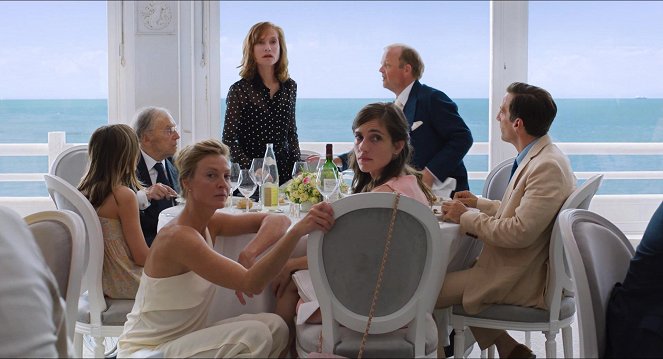Rendező:
Michael HanekeForgatókönyvíró:
Michael HanekeOperatőr:
Christian BergerSzereplők:
Isabelle Huppert, Toby Jones, Mathieu Kassovitz, Jean-Louis Trintignant, Loubna Abidar, Dominique Besnehard, Hassam Ghancy, Franck Andrieux (több)Tartalmak(1)
„Körülöttünk a világ, s mi a közepén, vakon." A Happy end pillanatkép egy nagypolgári európai család életéből. Anne Laurent a dinasztia motorja, ő az egész családnak otthont adó calais-i kúria és birtok úrnője. Apjától, az egyre inkább leépülő Georges-től nemrég vette át a családi építőipari cég vezetését, és eljegyzésére készülődik egy sikeres brit üzletemberrel. Egy nap azonban fiának, az alkoholista Pierre-nek a nemtörődömsége miatt súlyos baleset történik az egyik építkezésen, és ennek következményeivel bíróság előtt kell elszámolnia. Öccsével, Thomasszal is egyre nehezebben értik meg egymást: a férfi a felszínen kedélyes férj és mintaapa, de kiderül, hogy sötét titkokat rejteget. Amikor hirtelen megérkezik a házba Thomas első házasságából született, 12 éves lánya is, a feszültség tapinthatóvá válik. (CirkoFilm)
(több)Recenziók (4)
Ezúttal semmi rejtély, nincsenek thriller elemek, sem sötét tónusok. A Happy End "csak" egy visszafogott, átgondolt látogatás a polgári világba, olyan találó és cinikus befejezéssel, hogy (talán) olyan nevetésre késztet, mint semmi Michael H.-től. Természetesen anélkül, hogy akár csak egy szemvillanásnyit is ránézne a vígjáték műfajára. A professzor ismét látszólagos részletekkel és azok későbbi összefüggéseivel szórakoztat bennünket (üvegen keresztül készült felvétel, kutyaugatás mellett), ezúttal a gazdagok és a szeretni képtelenek felszínességének kritikájával kísérve.
()
Professor Haneke has taken his method to a bland thesis. There’s pathology everywhere, but no diagnosis. Indifference, predictability, and a state where the director registers the changes of the times, but can no longer observe them insightfully, let alone understand them. It’s an empty creative bubble, and that’s a shame. An academic sedan, the windows empty.
()
From the audience's point of view, this is an extremely demanding spectacle, mainly because Haneke apparently decided to indulge in leaving things out. So many scenes deliberately lack context, which is instead given to them tens of minutes later. A typical example is that you might see someone writing an email to someone, but you don't know who it is and you don't know to whom it is being written. Or that someone gets punched at a housing estate, but you don't see by whom and you don't know why, and the answer is revealed later throughout the film. You can always find out from someone else indirectly, long after the incident, that a character has attempted suicide, has gotten engaged, or is dead. There is a connection with the film Love, but it's basically not important and you don't even have to see that film. In any case, this narratively complicated jigsaw puzzle, requiring extraordinary audience attention, brings nothing other than a glimpse into the personal motives and tragedies of a rich bourgeois family, which is a pity.
()
It's admirable how Michael Haneke, in his advanced age, has chosen such a trendy style of cinematic storytelling to achieve the desired result. Thanks to this, he managed to make a film that says a lot about the state of modern society, which is slowly disintegrating. If the family is to be the foundation of the state, then let's face it, that disintegration seems in many ways inevitable in the current situation. Haneke's bitingly cynical view of the world reaches its maximum intensity at the very end, and not only in relation to the film's title. (80%)
()

